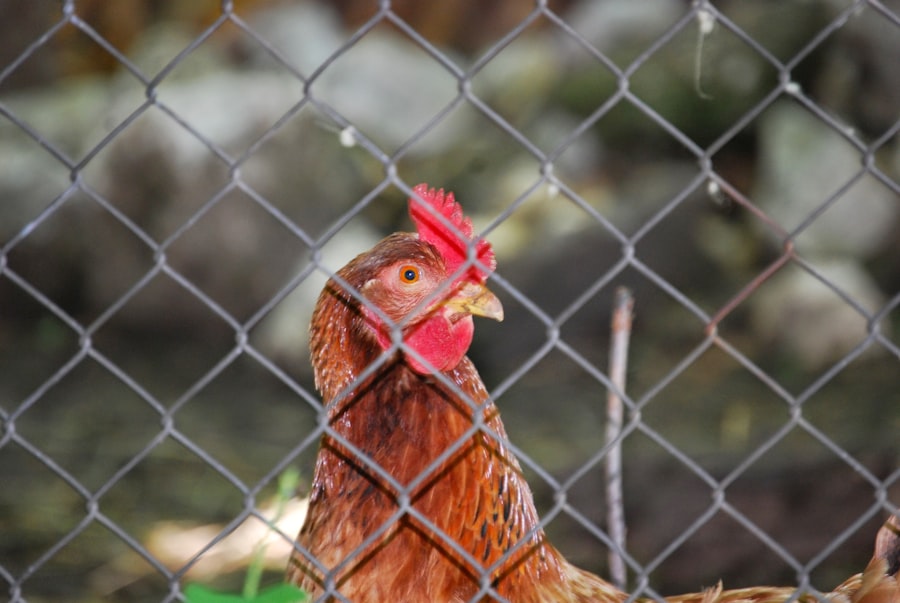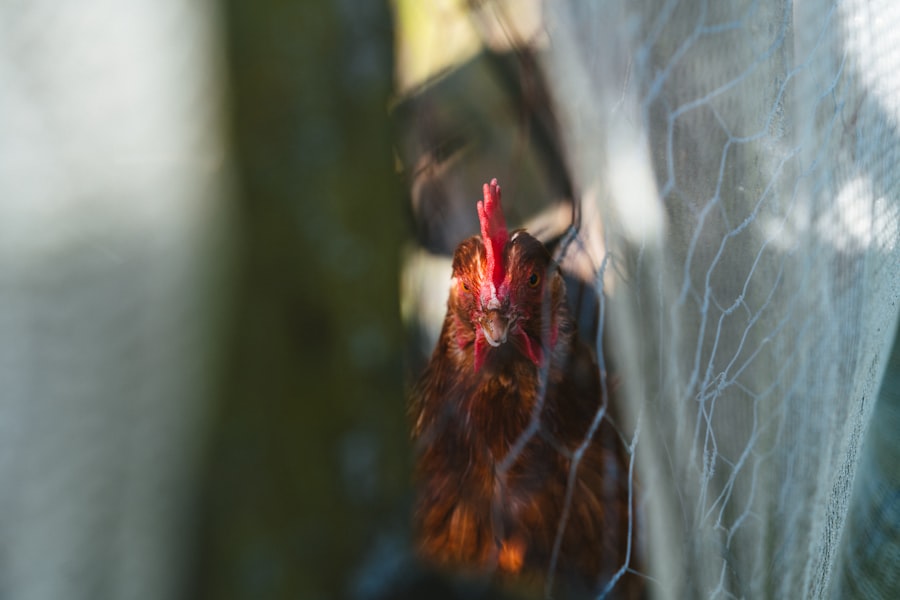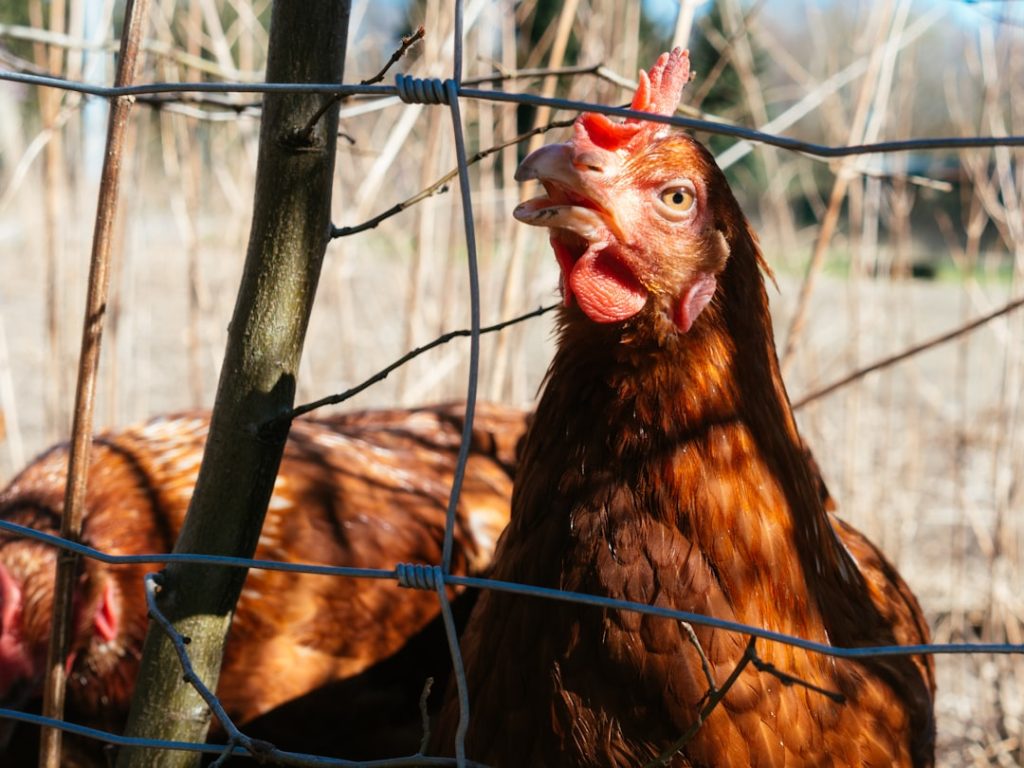Chickens may approach residential areas for several reasons. A primary factor is the availability of food sources in yards, such as birdseed, pet food, or food scraps. Chickens are opportunistic eaters and will exploit accessible food options.
Gardens and fruit trees can also attract chickens due to the presence of insects, worms, and fallen fruit. Shelter is another motivating factor; chickens may seek refuge in bushes, shrubs, or other hiding spots near homes to protect themselves from predators or adverse weather conditions. Compost piles and open garbage cans can also draw chickens, offering potential food and shelter.
Alternatively, chickens may venture near houses due to inadequate conditions in their own environment. Overcrowded, poorly maintained, or under-resourced neighboring chicken coops may cause chickens to search for better living conditions elsewhere. When addressing chicken infestations near homes, it is essential to consider both the attractants in the immediate vicinity and the surrounding conditions that may be driving chickens to seek alternative habitats.
Chickens are inherently inquisitive and adaptable animals, capable of identifying and utilizing opportunities for sustenance, shelter, and safety. Understanding the underlying reasons for their presence near residential areas can aid in developing effective strategies to deter them.
Table of Contents
- 1 Creating physical barriers to keep chickens away
- 2 Using natural deterrents to repel chickens
- 3 Implementing sound and visual deterrents to discourage chickens
- 4 Properly storing food and waste to avoid attracting chickens
- 5 Establishing designated areas for feeding and watering chickens
- 6 Seeking professional assistance for persistent chicken infestations
- 7 FAQs
- 7.1 What are some natural ways to keep chickens away from your house?
- 7.2 Are there any commercial products available to keep chickens away?
- 7.3 Why is it important to keep chickens away from your house?
- 7.4 Can keeping chickens away from your house be harmful to the chickens?
- 7.5 What are some common mistakes to avoid when trying to keep chickens away from your house?
Key Takeaways
- Chickens may come near your house due to seeking food, water, shelter, or simply being attracted to the environment.
- Creating physical barriers such as fences, netting, or chicken wire can effectively keep chickens away from your property.
- Natural deterrents like citrus peels, coffee grounds, or predator urine can be used to repel chickens from your yard.
- Implementing sound deterrents like wind chimes or visual deterrents like scarecrows can discourage chickens from coming near your house.
- Properly storing food and waste in sealed containers can help avoid attracting chickens to your property.
- Establishing designated areas for feeding and watering chickens away from your house can help prevent them from coming near your property.
- Seeking professional assistance from pest control or animal control services may be necessary for persistent chicken infestations.
Creating physical barriers to keep chickens away
Fencing: A Key to Keeping Chickens Out
One effective way to keep chickens away from your home is to create physical barriers that prevent them from accessing your property. This can include installing fencing around your yard or garden to keep chickens out. The type of fencing you choose will depend on the size of the area you need to protect and the specific behavior of the chickens in your area.
Choosing the Right Fencing for Your Needs
For smaller areas, such as a garden or flower bed, a simple wire mesh fence may be sufficient. However, for larger areas or areas with more persistent chickens, a taller and sturdier fence may be necessary.
Additional Barriers for Extra Protection
In addition to fencing, you can also use physical barriers such as netting or covers to protect specific food sources or areas of your yard. For example, if you have fruit trees or berry bushes that are attracting chickens, covering them with netting can prevent the chickens from accessing the fruit. Similarly, using covers on compost bins or garbage cans can prevent chickens from scavenging for food in these areas.
Using natural deterrents to repel chickens

In addition to physical barriers, you can also use natural deterrents to repel chickens from your property. One common natural deterrent is the use of strong scents or flavors that chickens find unpleasant. For example, sprinkling cayenne pepper or garlic powder around areas where chickens are congregating can discourage them from staying in those areas.
Similarly, planting strong-smelling herbs such as lavender or mint around your yard can help deter chickens from entering. Another natural deterrent is the use of predator urine or other animal-based repellents. Many garden supply stores sell predator urine in liquid or granular form, which can be spread around your yard to create the impression that predators are present.
Additionally, some homeowners have had success using hair clippings from pets or humans as a natural deterrent, as the scent of hair can signal danger to chickens. Finally, you can also use natural barriers such as thorny bushes or prickly plants to discourage chickens from entering certain areas of your yard. Chickens prefer open spaces where they can easily see and access food sources, so planting dense or thorny vegetation can make these areas less appealing to them.
Implementing sound and visual deterrents to discourage chickens
In addition to physical and natural barriers, you can also implement sound and visual deterrents to discourage chickens from coming near your home. One common sound deterrent is the use of motion-activated devices that emit loud noises when they detect movement. These devices can startle and scare off chickens when they approach, making them less likely to return to your property in the future.
Another sound deterrent is the use of ultrasonic devices that emit high-frequency sounds that are unpleasant to chickens. These devices are often used in combination with motion sensors to create a more effective deterrent system. Additionally, some homeowners have had success using recordings of predator calls or distress calls from other birds to deter chickens from entering their yards.
In terms of visual deterrents, reflective surfaces such as aluminum foil strips or shiny objects like CDs can be hung around your yard to create visual disturbances that make chickens uncomfortable. Additionally, some homeowners have had success using scarecrows or other decoys that resemble predators to deter chickens from entering their property. By implementing sound and visual deterrents in addition to physical and natural barriers, you can create a comprehensive deterrent system that effectively discourages chickens from coming near your home.
Properly storing food and waste to avoid attracting chickens
One important step in preventing chickens from coming near your home is to properly store food and waste that may attract them. This includes securing garbage cans with tight-fitting lids to prevent chickens from accessing food scraps and other waste. Additionally, if you have outdoor pet food or bird feeders, it’s important to store these items in sealed containers or bring them indoors at night to prevent them from becoming a food source for chickens.
In addition to securing food sources, it’s also important to properly manage compost piles and other organic waste that may attract chickens. This includes regularly turning and covering compost piles to reduce odors and make them less appealing to chickens. If possible, consider using enclosed compost bins with lids to further deter chickens from scavenging for food in these areas.
By properly storing food and waste on your property, you can reduce the likelihood of attracting chickens and create a less appealing environment for them to inhabit.
Establishing designated areas for feeding and watering chickens

Designated Feeding and Watering Areas
If you live in an area where chickens are common, it’s essential to establish designated areas for feeding and watering them. By providing a specific space for these activities, you can prevent neighboring chickens from wandering onto your property in search of food and water.
Communal Feeding and Watering Areas
One option is to work with your neighbors to establish a communal feeding and watering area for their chickens. This shared space on one neighbor’s property can be used by all nearby chicken owners, reducing the likelihood of chickens roaming onto other properties in search of food and water.
Establishing Clear Boundaries
If communal feeding and watering areas are not feasible, consider working with your neighbors to establish clear boundaries for where their chickens are allowed to roam. This can include installing fencing or other physical barriers to prevent chickens from crossing onto neighboring properties. Additionally, providing education and resources to neighboring chicken owners about proper care and management practices can help reduce the likelihood of their birds becoming a nuisance in the surrounding area.
Preventing Chicken Infestations
By establishing designated areas for feeding and watering chickens and working with neighbors to address potential issues, you can help prevent chicken infestations near your home. This collaborative approach can lead to a more harmonious coexistence with neighboring chickens.
Seeking professional assistance for persistent chicken infestations
If you have tried various deterrent methods and are still experiencing persistent chicken infestations near your home, it may be time to seek professional assistance. Pest control companies and wildlife management professionals have experience dealing with nuisance wildlife, including chickens, and can provide effective solutions for addressing infestations. Professional assistance may involve conducting a thorough assessment of your property to identify attractants and potential entry points for chickens.
Based on this assessment, professionals can recommend and implement targeted deterrent methods that are tailored to your specific situation. This may include installing exclusion devices such as netting or fencing, as well as using repellents and other deterrents that are safe and effective for deterring chickens. In some cases, professional assistance may also involve working with local authorities or animal control agencies to address persistent chicken infestations in the surrounding area.
By collaborating with these organizations, you can access additional resources and support for addressing the root causes of the infestation and implementing long-term solutions. Overall, seeking professional assistance for persistent chicken infestations near your home can help you effectively address the issue and prevent future problems. By working with experienced professionals who understand the behavior of chickens and how to deter them effectively, you can create a more peaceful and harmonious living environment for both yourself and your neighbors.
In conclusion, addressing chicken infestations near your home requires a comprehensive approach that addresses both the attractants on your property and the conditions in the surrounding area that may be driving the infestation. By understanding the reasons behind chickens coming near your house and implementing a combination of physical barriers, natural deterrents, sound and visual deterrents, proper food and waste storage practices, designated feeding and watering areas for neighboring chickens, and seeking professional assistance when needed, you can effectively discourage chickens from coming near your home and create a more peaceful living environment for yourself and your neighbors.
If you’re looking for tips on how to keep chickens away from your house, you may also be interested in learning about different types of chicken coops. Check out this article on chicken coop options in Muskegon to find the perfect setup for your feathered friends.
FAQs
What are some natural ways to keep chickens away from your house?
Some natural ways to keep chickens away from your house include using strong-smelling herbs and plants, such as lavender or mint, creating physical barriers like fences or chicken wire, and using motion-activated sprinklers to deter them.
Are there any commercial products available to keep chickens away?
Yes, there are commercial products available such as chicken repellent sprays, ultrasonic devices, and visual deterrents like reflective tape or scarecrows that can help keep chickens away from your house.
Why is it important to keep chickens away from your house?
Keeping chickens away from your house is important to prevent damage to property, reduce the risk of disease transmission, and maintain a clean and sanitary living environment.
Can keeping chickens away from your house be harmful to the chickens?
As long as the methods used to keep chickens away from your house are non-toxic and humane, they should not cause harm to the chickens. It’s important to use deterrents that do not pose a risk to the chickens’ health and well-being.
What are some common mistakes to avoid when trying to keep chickens away from your house?
Common mistakes to avoid when trying to keep chickens away from your house include using harmful chemicals or substances, neglecting to secure food sources, and not addressing the root cause of the chicken presence, such as access to food or shelter.
Meet Walter, the feathered-friend fanatic of Florida! Nestled in the sunshine state, Walter struts through life with his feathered companions, clucking his way to happiness. With a coop that’s fancier than a five-star hotel, he’s the Don Juan of the chicken world. When he’s not teaching his hens to do the cha-cha, you’ll find him in a heated debate with his prized rooster, Sir Clucks-a-Lot. Walter’s poultry passion is no yolk; he’s the sunny-side-up guy you never knew you needed in your flock of friends!







